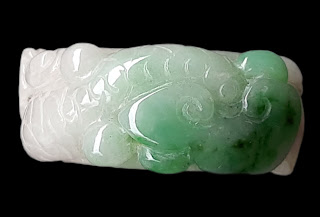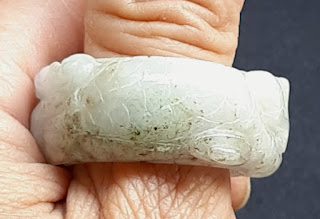清朝乾隆時期冰種春帶彩紫飄綠花巧雕靈芝如意翡翠雕四爪龍吐珠與靈芝如意王用扳指
Qing Dynasty Qianlong period ice type spring purple with colorful green, cleverly carving Ganoderma lucidum Ruyi, jadeite carved four-clawed dragon vomiting out a jewelry bead and Ganoderma lucidum Ruyi pattern King's archery thumb ring
https://youtu.be/RsKai_yiaeA?si=LadMI_mIG_l5ujbv
https://youtu.be/ln4h2Q-FlgA?si=AocvO8IIQqUbRkIX
https://youtube.com/shorts/vduiPXFLxLU?si=hwxhO3JP0AGjuQ1f
重量: 22 公克 grams
比重: 3.3 (翡翠比重)
尺寸: 高 1.4 X 內圈直徑 2.2 x 外圈直徑 3.6 x 厚 0.7 厘米 cm
Weight: 22 grams
Specific gravity density: 3.3 (The specific gravity density of jadeite)
Dimension: Height 1.4 x Inner ring diameter 2.2 x Outer ring diameter 3.6 x Thickness 0.7 cm
明清時候龍的爪數劃分為,五為君、四為王公藩王親王、三為官員。「五爪龍」代表皇帝,「四爪龍」代表皇族成員。「三爪龍」則用在各級官員身上的官袍上。五爪龍是皇帝專用,其他人是不可使用,而一般的藩王親王則是四爪龍,即所謂的「蟒」,例如,繡有四隻爪子的龍之官服稱為「蟒袍」 。如果有某個親王敢穿著五爪龍的服飾等同於宣布造反,有這樣的膽子就得說他是提著腦袋穿衣服了。
龍吐珠有騰龍獻寶、富貴吉祥的寓意。
此翡翠扳指係來源所有人陳俊英女士 ( 1932 - ) 的父親陳萬承是明朝洪武十八年 (公元 1385 年) 被明朝皇帝朱元璋封為軍事大元帥的先祖陳秀甫的第 20 代後裔。
清朝的扳指在統治階層非常流行,分為文扳指和武扳指,文扳指是文臣佩戴,講究材質珍貴、工藝複雜和外觀美麗,武扳指則是武臣佩戴,在工藝和外觀上並不講究,通常素面無紋,而此翡翠扳指是個文扳指。
清代各種規制日趨完善,扳指雖小卻也是森嚴等級的一種象徵,多以玉石、翡翠、瑪瑙、珊瑚等名貴材料製作的扳指,非皇室貴冑一般人是不敢也不能隨意佩戴的。普通旗人佩戴的扳指,以白玉磨製者為最多,貴族扳指則以翡翠質料者為上選。
清朝諸位帝王對翡翠扳指喜愛有加,因而盛極一時,達官貴人喜歡將之戴在手指摩挲,流露出地位、權利、富貴和氣質,遂成為身分地位的表徵。紀曉嵐在《閱微草堂筆記》中記載,翡翠因其美麗稀有,在乾隆朝早期到中晚期短短五、六十年間,即從鮮為人知的玉材一躍而上,價值超過和闐美玉,成為「玉石之王」。然上等質地翡翠不需再施雕琢,以翡翠本身天然成色取勝。故本件翡翠冰種春帶彩紫飄綠花巧雕靈芝如意,不但外觀高貴迷人,並且明顯係由清朝乾隆皇室的精湛雕刻工藝所精心製作,真是精美無比,是為上品中的極品。
把價值美金八百萬元的翡翠扳指套在拇指上,究竟是何種感覺呢?
In the Ming and Qing Dynasties, the number of dragon claws was divided into five for emperors, four for princes, the important male members of imperial family, vassals, and three for officials. The "five-clawed dragon" represents the emperor, and the "four-clawed dragon" represents the important male members of imperial family. "Three-clawed dragon" is used on the official robes of officials at all levels. The five-clawed dragon is exclusive to the emperor and cannot be used by others, while the general vassals, important male members of the royal family and princes use four-clawed dragons, the so-called "python". For example, the official uniform of a dragon embroidered with four claws is called a "python robe". If a certain important male member of the royal family dares to wear the costume of a five-clawed dragon, it is equivalent to declaring rebellion. If he has such courage, it must be said that he is wearing clothes while his head carrying in his hand.
The dragon vomiting out a jewelry bead has the meaning of a soaring dragon offering treasure, wealth, nobility and good auspicious luck.
This jadeite carved archery thumb ring is attributed to the owner, Ms. Chen Junying (1932-), whose father, Chen Wancheng, was the 20th generation descendant of ancestor Chen Xiufu. Chen Xiufu was nominated as military generalissimo by Emperor Zhu Yuanzhang of the Ming Dynasty in the 18th year of Hongwu period in the Ming Dynasty (AD 1385).
The Qing Dynasty's archery thumb ring was very popular among the ruling class people. It was divided into civil archery thumb ring and military archery thumb ring. Civil archery thumb ring was worn by civil servants and paid attention to precious materials, complex craftsmanship and beautiful appearance. Military archery thumb ring was worn by military officials and was not particular about craftsmanship and appearance. The surface of military archery thumb ring is usually plain and has no patterns. This jadeite carved archery thumb ring is a civil archery thumb ring.
In the Qing Dynasty, various regulations were gradually perfect. Although the archery thumb ring was small, it was also a symbol of strict hierarchy. Archery thumb rings were mostly made of jade, jadeite, agate, coral and other precious materials. Most people who were not members of the royal family and nobles did not dare and could not wear them casually. The archery thumb rings worn by ordinary bannermen are mostly made of white jade, while the archery thumb rings worn by nobles are made of jadeite as the best selection.
The emperors of the Qing Dynasty were very fond of jadeite carved archery thumb rings, so they became very popular for a while. Dignitaries liked to wear them on their fingers and rub them, revealing status, power, wealth and temperament, and it became a symbol of status. Ji Xiaolan recorded in "Notes of Yuewei Thatched Cottage" that due to its beauty and rarity, jadeite jumped from a little-known jade material to a value exceeding that of Khotan jade in just 50 to 60 years from the early to the middle upto late Qianlong period of dynasty, and became the "King of Jade". However, high-quality jadeite does not need to be carved, and the natural color of the jadeite prevails itself. This jadeite carved archery thumb ring with ice type spring purple with colorful green, cleverly carving Ganoderma lucidum Ruyi, not only has a noble and charming appearance, but is also clearly made with excellent carving techniques by the Qianlong imperial workshop of the Qing Dynasty. It is truly exquisite and is the best of the best.
How does it feel to put an eight million US dollars' jadeite carved archery thumb ring on your thumb?
Works of Art
Provenance:
Ms. Chen Junying (1932- ). Her father Chen Wancheng was the 20th generation descendant from the ancestor Chen Xiufu [Official name: Guangludafu, an official who was close to the Emperor, and acted according to the edict of the Emperor, also the founding hero of the Ming Dynasty, from Wuhua, Guangdong.], who was nominated as the military Marshal by Ming Emperor Zhu Yuanzhang in Hongwu 18th year (1385 A.D.) Ming Dynasty. She has inherited the family handed-down ancestral collection, including valuable ceramics, jade carved works of art, antiques, bronzes, and Chinese paintings moving from mainland China to Taiwan since Qing dynasty, from her father Chen Wancheng and has been trained to be a good professional collector and an excellent appraiser by family education since childhood for over 80 years.
Chen Xiufu
Official name: Guangludafu, an official who was close to the Emperor, and acted according to the edict of the Emperor, also the founding hero of the Ming Dynasty, from Wuhua county, Guangdong Province, China.
Chen Xiufu was nominated as the military Marshal by Ming Emperor Zhu Yuanzhang in Hongwu 18th year (1385 A.D.) Ming Dynasty.
http://www.nanchens.com/xqxx/xqxx32/xqxx32510.htm
https://www.xuehua.tw/a/5ec8742f868e1a463e412f06
https://ppfocus.com/0/cu4cb061d.html
藝術品
來源:
陳俊英女士 ( 1932 - )。她的父親陳萬承是明朝洪武十八年 (公元 1385 年) 被明朝皇帝朱元璋封為軍事大元帥的先祖陳秀甫 (明代開國功臣光祿大夫 [為皇帝近臣依皇帝詔命行事] 陳秀甫 [廣東五華籍]) 的第 20 代後裔。她從父親陳萬承處繼承了家族傳世的祖傳藏品,包括自清朝以來從中國大陸移至台灣的珍貴陶瓷器、玉器、古董、青銅器和中國書畫,她自童年開始透過家庭教育,即被培養成為一位很棒的專業收藏家和優秀的鑑賞家已達 80 多年。
陳秀甫
陳秀甫是明代的開國功臣光祿大夫 [此官名為皇帝近臣依皇帝詔命行事],中國廣東省五華縣人。
明朝洪武十八年 (公元 1385 年) 陳秀甫被明朝皇帝朱元璋封為軍事大元帥。
http://www.nanchens.com/xqxx/xqxx32/xqxx32510.htm
https://www.xuehua.tw/a/5ec8742f868e1a463e412f06
https://ppfocus.com/0/cu4cb061d.html


%206000%20(2)%20(1).png)
%206000%20(1).png)

































沒有留言:
張貼留言